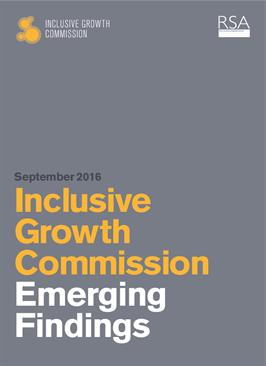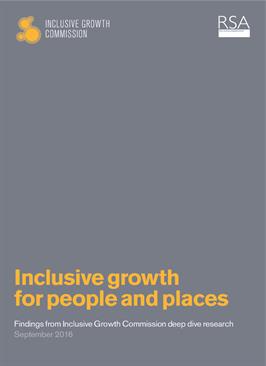In a world in which it is cities that are increasingly the primary drivers of growth, urban areas are also the places where people are most experiencing the downside of unbalanced growth.
Too many people are being left behind and this is now the biggest economic challenge facing our society. The RSA Inclusive Growth Commission, chaired by the economist Stephanie Flanders, has been set up to examine how the UK can develop a place based model of economic development that promotes inclusive growth.
The Commission’s interim report outlines and tests some of its emerging thinking and to influence the policy environment in the run-up to the Autumn Statement. Initial work by Commission partner New Economy estimates that addressing the ‘inclusivity gap’ could increase GVA by £192bn per year(see the methodology paper and dataset for more details).
The Brexit vote has shaken up orthodox economic assumptions and revealed the extent of voter dissatisfaction with our current economic model. Change is in the air. We have a new Government, led by a Prime Minister who has called for economic reform in order to deliver an ‘economy that works for everyone’. Because of its timing, much of this report is about what national government should do to support place based inclusive growth. Our final report will look in more detail at what cities and localities could do to drive inclusive growth, both with the powers they already have, and with the new powers and funding which we propose for them.
The report proposes a policy framework based on the following elements:
- Integrating economic and social policy
- Devolution that is social as well as economic
- More funding to support inclusive growth at a local level
- Prioritising prevention and early intervention.
The interim report sets out a short-term roadmap towards inclusive growth, based on:
- Inclusive Devolution and the Autumn statement. The Government should set out how the next phase of more ‘grown up devolution’ can promote inclusive growth. This should entail a clear process for social devolution, a recognition that more inclusive growth will require more local resources, and filling the gap left by European Social Funding and the European Investment Bank.
- Investment in social as well as physical infrastructure. We need to put social capital on par with traditional physical infrastructure when we consider how to invest public resources in future growth.
- Putting inclusion in industry strategy. The Government is currently developing a new industry strategy, and this must have a strong local dimension and inclusive growth as one of its central objectives. We recommend an industrial strategy that invests in physical and human infrastructure and sees them as interlinked; is not only about high growth sectors but also raising skills and progression in the lower and middle end of labour markets; and prioritises connecting people to economic opportunities, through better skills planning and provision.
- Economic policy and measurement frameworks that prioritise inclusive growth. We need to change the policy and measurement frameworks for major investments to tilt the balance towards more broadly defined growth benefits. The report proposes ‘quality GVA’ as a wider measurement framework for growth, enabling us to measure not just aggregate growth, but also changes in inequality, the impact of investment on deprived populations and how far economic prosperity has spread.
The interim report was informed by and is being published alongside Inclusive Growth for People and Places, a report that presents findings from the Commission’s ‘deep dive’ research in Bradford, Cardiff city region and Newcastle.
For Commission partner New Economy’s initial analysis of the ‘inclusivity gap’, please download the methodology paper and dataset.
Read the report on Medium: Inclusive Growth Commission - emerging findings
Download the report: Inclusive Growth Commission - emerging findings (PDF, 10.8MB)
Find out more about the Inclusive Growth Commission
pdf 10.8 MB
Related reports
-
Inclusive Growth for People and Places: Challenges and Opportunities
In order to inform its analysis of place-based dimensions of inclusive growth, the Commission undertook three ‘deep dive’ research visits in Bradford, Cardiff city region and Newcastle.

